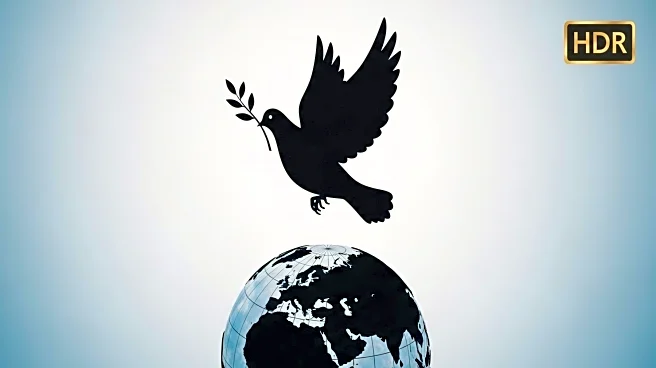What's Happening?
President Trump is actively seeking to win a Nobel Peace Prize by addressing two major conflicts: the war in Ukraine and the Gaza conflict. In Ukraine, a potential settlement is emerging after a series of diplomatic engagements involving Trump, President Zelensky, and European leaders. The proposed deal includes security guarantees from the US and NATO allies to support Ukraine's defense and potential land swaps to establish secure borders. Concurrently, the European Union is considering using over $300 billion in frozen Russian assets as a loan to bolster Ukraine's economy and defense. In Gaza, Trump has presented a 20-point plan to end the conflict, which includes Israel renouncing annexation plans and Hamas relinquishing control over Gaza. This plan has garnered support from several Arab and Muslim-majority states, aiming to establish new governance structures in Gaza.
Why It's Important?
The resolution of these conflicts could have significant implications for international peace and stability. In Ukraine, a successful settlement could deter further Russian aggression and stabilize Eastern Europe, while in Gaza, ending the conflict could lead to improved relations between Israel and Palestine, fostering regional peace. Trump's efforts, if successful, could enhance his international standing and potentially earn him the Nobel Peace Prize. The use of frozen Russian assets to support Ukraine could set a precedent for international financial interventions in conflict zones. Additionally, the resolution of these conflicts could reduce global tensions, particularly in relation to Russian and Iranian ambitions, and potentially influence other geopolitical issues, such as the situation in Taiwan.
What's Next?
The next steps involve continued diplomatic efforts to finalize the proposed settlements in both Ukraine and Gaza. In Ukraine, the focus will be on securing commitments from NATO allies and maintaining pressure on Russia through sanctions. In Gaza, negotiations are ongoing to ensure Hamas complies with the plan, including the release of hostages and relinquishing control. The international community, particularly countries with influence over Hamas, will play a crucial role in facilitating these outcomes. The Nobel committee will make its decision for the 2026 prize next year, and Trump's continued focus on these issues will be critical in determining his eligibility for the award.
Beyond the Headlines
The ethical and legal implications of using frozen assets for conflict resolution are significant, potentially influencing future international policy. The success of Trump's plans could reshape perceptions of his administration's foreign policy capabilities, impacting his political legacy. The broader cultural and societal impacts of resolving these conflicts could lead to increased cooperation and integration across affected regions, promoting long-term peace and stability.








